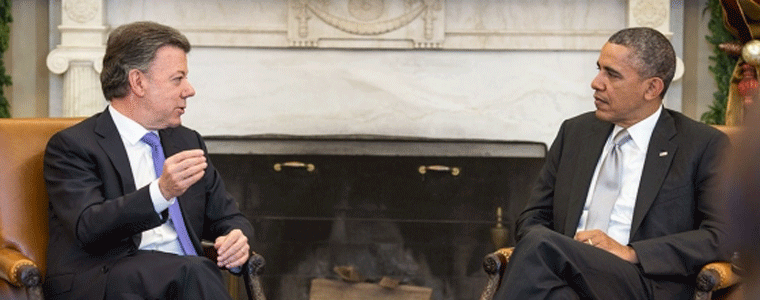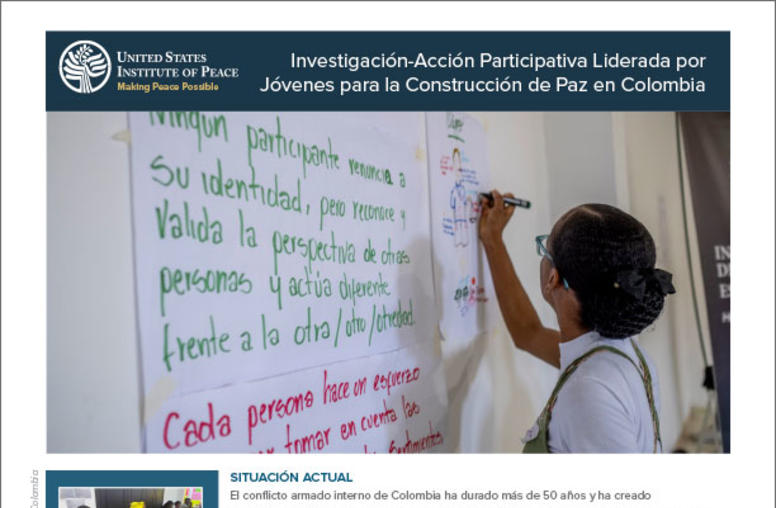
“Obviously, there are going to be some very challenging questions moving forward,” Obama said after meeting Santos in the Oval Office. “I’m pleased to see the President’s strong commitment on that front. The United States is supportive of those efforts.”
Santos also won a broadening of his country’s relationship with the U.S., from one that focuses almost entirely on security and drug trafficking to ties that extend to the realms of energy, education, science and technology, said Virginia M. Bouvier, USIP’s senior program officer for Latin America. It was his second U.S. visit as president and the first since announcing his bid for re-election on Nov. 20.
“My sense from the two days of the visit is that Santos is trying to shift the bilateral agenda away from drug trafficking and security issues and toward broader regional issues and a broader range of topics,” Bouvier said.
Santos aims for more of an equal partnership with the U.S. that acknowledges what Colombia has to offer, Bouvier said. That still includes a security and drugs agenda -- Colombia has taken on an expanding role as a leader in peacekeeping participation and in training of other forces in Central America and the Caribbean. But it now also takes in issues like expanding international education and technology exchanges.
“Santos wants to be seen as a partner, not a cause,” Bouvier said. Colombia has changed in recent years and stands on the edge of economic take-off—if he can resolve the internal armed conflict, she said. “With a successful peace process, the U.S.-Colombia relationship stands to gain in many ways. Santos underscored the incredible potential for mutual benefits in many fields.”
On the peace process, some of the items on the agenda in Havana will have implications for the international community and the U.S. in particular. Drug trafficking is one such issue. He has been a leader in the hemisphere in calling for new regional and global approaches to the problem. Santos acknowledged the longstanding U.S. bipartisan support to execute the war and to fight drug-trafficking through Plan Colombia, an $8 billion plus effort since 2000, and underscored that that level of aid is no longer necessary.
Colombian leadership and independence has been a mark of the process and a leitmotif of Santos’s visit, Bouvier said. Cuba and Norway have served as guarantors of the process, and Venezuela and Chile have accompanied the talks, but there has been no international mediator. Nonetheless, there are a number of issues that may require further cooperation from the international community. These include drug policy; extraditions; demobilization; disarmament, reintegration and reconstruction; truth-telling; and transitional justice.
In his meetings at the Organization of American States, where he also spoke while in Washington, Bouvier noted, Santos called on the international community to let Colombia find its way forward.
“He stressed that the peace process is a Colombian process and that Colombia should be allowed to find its own balance on the peace and justice formula,” Bouvier said. “This is a complicated issue, particularly given inter-American jurisprudence that prohibits amnesties for certain violations of human rights and international humanitarian law.”
The talks between the Colombian government and the FARC rebel group in Havana are moving steadily forward, and provisional agreements have been reached on agrarian development and terms for political participation of the rebels once a full accord is reached. Three substantive topics -- victims’ rights and reparations, the terms for ending the conflict, and illicit crop cultivation and drug trafficking -- remain on the peace agenda. The current round of talks, begun on Nov. 28, is focused on drug trafficking.
Since the last Summit of the Americas, Santos has called for new thinking on drug policies. In Colombia, drug-trafficking has helped to finance all parties to the internal armed conflict, and crop cultivation has provided impoverished peasants in areas underserved by the government with the means to survive.
Providing alternative development options and addressing the scourge of drug trafficking are thus seen as integral to ending the conflict, Bouvier noted. Just this week in Havana, the FARC presented a list of 10 minimum proposals on the question of illicit crops and narcotics trafficking. Their proposal called for investment in development of alternative crops, the legalization of illicit crop cultivation for uses such as in medicines, the suspension of aerial fumigation, and the treatment of drug use as a public health rather than criminal issue. This would require a major rethinking of U.S. policy, one that is already under way, said Bouvier.
White House statements and remarks by Obama largely steered clear of such specifics, except for a brief reference to land restitution.
“The United States reaffirmed its longstanding defense and security partnership with Colombia, and strongly supports Colombia’s unwavering commitment to seeking a durable peace, including through the peace talks now underway,” the White House said in a statement on its website. The U.S. Agency for International Development announced $68 million to help Colombia restore land to victims of conflict, issue land titles, and increase opportunities for small farmers to develop viable rural livelihoods, according to the statement. In addition, USAID will help expand the coverage of legal protection of land rights, especially those of small farmers, by strengthening the Colombian government’s land titling efforts.
Santos also met with Republican and Democratic leaders on Capitol Hill to brief them on the peace talks and seek to ensure that U.S. support is solidly behind the process. He was accompanied in his meetings by Luis Carlos Villegas, Colombia’s newly arrived ambassador to the U.S. who just left his role as one of the government’s negotiators in Havana to assume his new position in Washington.
Viola Gienger is a senior writer at USIP.


